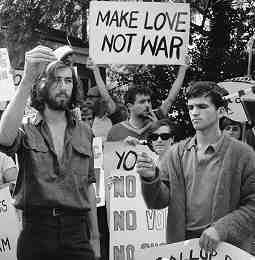a review of
Hell, No, We Didn’t Go! by Eli Greenbaum. University Press of Kansas, 2024
The U.S. invasion of Indochina not only unleashed horrific death and  destruction resulting in the murder of millions of Vietnamese, but also engendered massive domestic opposition. One of the significant flash points was the military draft.
destruction resulting in the murder of millions of Vietnamese, but also engendered massive domestic opposition. One of the significant flash points was the military draft.
Although the state had relied on conscription periodically since the Revolutionary War to enable the prosecution of its wars, the institutionalization of the Selective Service System (SSS) in 1940 in preparation for World War II and in the Cold War that followed, served as the mechanism for channeling young men into the military machine.
Indeed, the Selective Service System produced an internal memo labeled “Channeling” in 1965 that aligned the “national interest” with specific deferments from induction. Among them was a 2S category that allowed students to escape the draft, privileging in the process, predominantly white middle class college-bound youth.
In the revelatory words of the document, “the psychology of granting choice under pressure…is an American or indirect way of achieving what is done by direction in foreign countries.” In other words, a constrained choice with resonances of an authoritarian state!
Claiming that U.S. warships were attacked in August 1964 by North Vietnamese gunboats in the Gulf of Tonkin, a fabrication highlighted in The Pentagon Papers, President Lyndon Johnson received the unlimited power from the U.S. Congress to escalate the war. Soon, induction notices began arriving in young men’s mailboxes.
It is estimated that two million men were drafted between the summer of 1964 and 1973, the last year of the draft and the defeat of the U.S. forces in Vietnam. That same period, however, witnessed an unprecedented number of draft violations with half a million young men refusing, either directly or indirectly, to submit to orders to report for so-called duty.
Hell, No, We Didn’t Go! is Eli Greenbaum’s compelling story of how and why so many sought to evade the draft, risking legal punishment. Through the use of incisive and interesting first-person interviews, Greenbaum reveals the wide variety of interactions with the draft and the myriad forms of evasion and refusal.
As he notes, “If you were determined to avoid the draft and stay out of the army, there were plenty of imaginative roads to follow to achieve a Selective Service classification that would set you free.”
It is clear from the stories recounted in Greenbaum’s book that the foundational motivation for opposing the draft was, in his words, “because we doubted the legitimacy of the war.”
While those of us who challenged the draft through outright resistance play a part in his narrative, Greenbaum’s main focus is on men, like himself, who opposed the war, but were unwilling to risk prison as some twenty to thirty thousand of us resisters did.
The class privileges and capriciousness of the draft continued even after the introduction of a lottery in December 1969. When President Richard Nixon signed the lottery into law, he believed that it would, in his words, “take care of a lot of draft dodgers.” Although it certainly re-configured the calculations for how to outmaneuver the system, it did not deter the continuation of challenges to the draft and resistance to the war machine.
According to one of Greenbaum’s interviewees who outfoxed the lottery: “Of course, it wasn’t fair that many of us would avoid the draft by a stroke of luck, while many underprivileged men chose to enlist because military service, even in wartime, was the best of otherwise bleak occupational alternatives. The system was unfair, and we knew it. We didn’t want them to go, but we sure didn’t want to go ourselves.”
Nevertheless, the diffusion of challenging the authority of the war machine, both outside and inside the military, led to the end of conscription.
As historian Penny Lewis argues, it was a combination of dissent and disobedience by GIs on the battlefields in Vietnam, coming from a political environment among young people rife with antiwar agitation in the U.S., that contributed to half a million desertions during the war and significant incidents of outright refusal to obey orders.
Added to the dissent and disobedience in the military, delegitimizing the draft and its punitive legal machinery led to its demise in 1973 in favor of a much more manageable volunteer army. Included in this undermining of the draft were hundreds of thousands of young men who even refused to register as was required by law upon one’s 18th birthday.
In some areas of the country, such as Oakland, California, over half of the 18-year-olds failed to report, and of those who did, more than eleven percent refused induction. In some judicial districts, at least half of the criminal cases by the early 1970s stemmed from draft violations. In turn, fewer and fewer were being sent to prison, although a total of 5,000 men were imprisoned. It’s not surprising that the draft and direct U.S. involvement in the Vietnam War collapsed in 1973.
Hell, No, We Didn’t Go! reminds the reader of this widespread dissent. Greenbaum’s concluding remarks are a testament to the degree and intensity of that opposition to the war during the Vietnam Era: “It took guts to say no to the Vietnam war machine, to a government and its systems geared to use you. It took courage to say no to the power of the military, to bullying bureaucrats, to the coercive nature of law enforcement, (and) to the politicians with their dubious motives and manipulative strategies.”
Fran Shor was an antiwar activist and draft resister during the Vietnam War. His semi-autobiographical novel of that resistance, Passages of Rebellion, is available with a subscription to the Fifth Estate. See Special Offers at fifthestate.org.
Related
See Fifth Estate’s Vietnam Resource Page.
